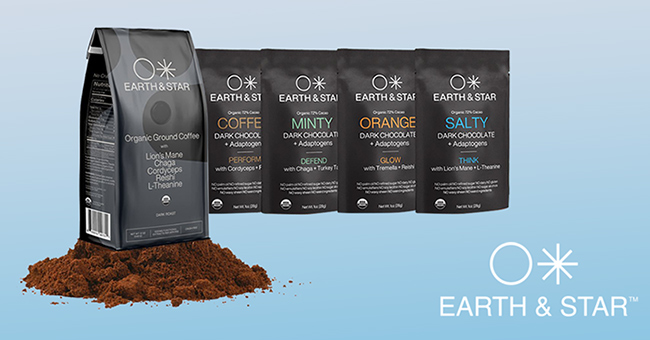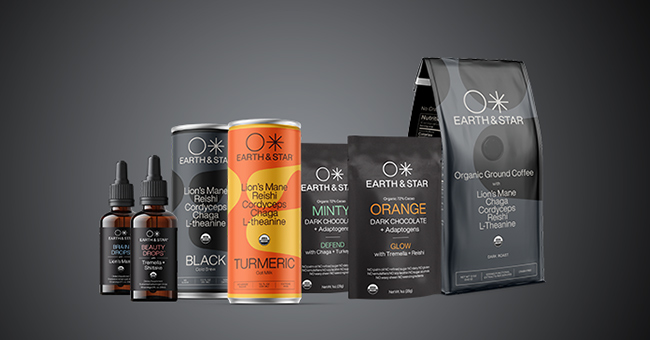When Zoe Sakoutis and Erica Huss launched their latest venture, Earth & Star, last year with a line of mushroom lattes, the intent was always to build the brand into a “mushroom platform.” Over a year later, the vision is taking shape.
According to Sakoutis and Huss, who previously helped kickstart the HPP juice trend as the founders of BluePrint, Earth & Star started with beverages as the format was familiar territory. Now, after “a very, very long time” working on R&D, Sakoutis said, the company is ready to establish its name via a broad product portfolio. This month, the New York-based brand released three new functional non-beverage product lines that all feature a blend of adaptogenic mushrooms as its star ingredient, delivered in an efficacious dose of 2000mg per serving.
One of the new products is organic ground coffee, a dark roast made with Lion’s mane, chaga, cordyceps and reishi mushrooms (plus L-theanine), which will retail for $24.99 per 12 oz. bag. According to Huss, the packaged coffee is the same blend used in the lattes and provides lower caffeine content with a more balanced energy boost.
The brand’s Mushroom Chocolate Bars will sell for $4.99 each and feature different functional benefits based on unique mushroom combinations, including Salty (‘Think’ with Lion’s mane and L-theanine), Coffee (‘Perform’ with cordyceps and reishi), Orange (‘Glow’ with tremella and reishi) and Minty (‘Defend’ with chaga and turkey tail). All four varieties are organic and use dark chocolate. Each two-serving bar contains 4 grams of sugar and 160 calories per package.
Finally, Earth & Star has added three functional tinctures, including Brain (Lion’s mane), Beauty (tremella and shiitake) and Everything (Lion’s mane, reishi, chaga, cordyceps and turkey tail). Each 2 oz. bottle contains 30 servings and retails for $34.99.
“[Functional mushrooms are] a category that’s moving very quickly and, as I’m sure you’ve noticed already, there are new brands growing like mushrooms,” Sakoutis said. “We felt like there are a number of occasions over the course of the day that are really valuable for people to add this extra functionality and we really wanted to kind of meet people where they are.”
To date the company has been financially bootstrapped with Sakoutis and Huss as the only team members. However, Sakoutis said they are now opening up a seed funding round with plans to begin adding full time employees in the near future.
While Earth & Star initially intended to launch into retail last spring, the pandemic prompted a strategic shift towards direct-to-consumer ecommerce, which remains the company’s primary sales channel. The brand has begun rolling out its lattes into brick-and-mortar stores, including Erewhon stores in California, Neighborhood Goods stores in Texas, 200 New York City metro area independent accounts, and hybrid brick-and-mortar/ecommerce retailer Foxtrot.
Huss added that the company has also partnered with Faire, a platform which connects ecommerce brands with independent retailers such as yoga studios and wellness boutiques around the country. Through Faire the brand is in roughly 40 additional stores in smaller towns and cities throughout the U.S.
According to an April report from Reportlinker, the global functional mushroom market — which includes all the varieties that Earth & Star are utilizing — was valued at $25.4 billion in 2020 and is expected to achieve a CAGR of 8.44% between 2021 and 2026. While other mushroom coffee brands such as Four Sigmatic (alongside various supplements) have been on the market for several years, the trend has taken off amid the pandemic due to the ingredients’ immunity boosting benefits, the report noted.
In addition to Four Sigmatic, Earth & Star’s extension in food and tinctures puts it into competition with a broader array of companies, including KOS, MUD/WTR and Om, that have varingly embraced functional mushrooms for coffees, powdered drinks and supplements.
“The ‘Shroom Boom’ is definitely happening,” Sakoutis said, noting that in addition to use as a meat alternative, mushrooms are also seeing more use outside of consumables, including in textiles. “It’s good timing for us. I think brands like Four Sigmatic and MUD/WTR have done a good job of introducing the idea and putting a dent in it, but there are still so many people who have yet to tap into the space.
“So we’re excited that for the first time we’re not going to be the first movers in the space, as we were with BluePrint, so we don’t have to do all the educating,” she added. “But we’re definitely going to be communicating in a much more consumer friendly way.”

